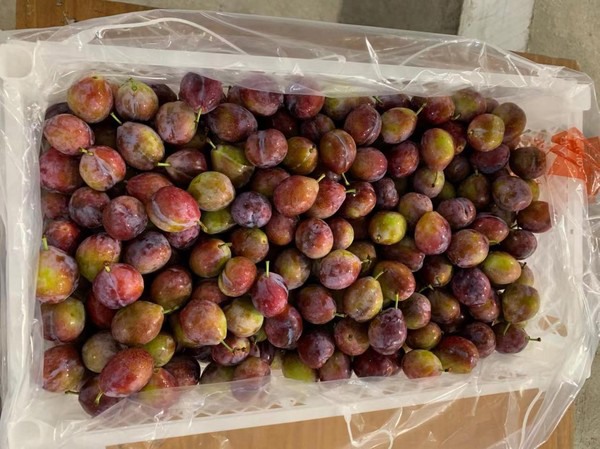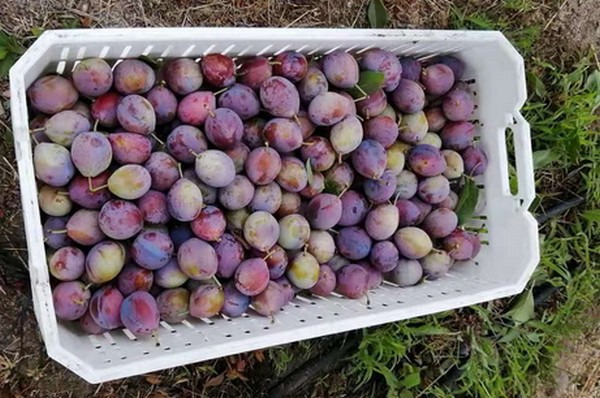Chinese consumers are paying much more attention to food safety issues since import cherries tested positive for Covid-19. Market conditions for many import fruits worsened as a result. Some importers are worried this situation will impact the market conditions for plums and grapes from countries in the southern hemisphere.
Andy is a spokesperson for Shanghai e-Fresh Trade Co., Ltd. The company sells plums, among other fruits. They currently import Australian plums via air-freight, and the first Chilean plums are already underway. These are expected to arrive in China by the end of February.
"Many consumers think plums are sour and the flavor is not great. However, technological improvements in post-harvest processing, packaging, and distribution have also improved the flavor. The surface area devoted to plum plantation is constantly growing. Plums from Xinjiang are quite popular as well, which helps spread the recognizability of plums in the Chinese market. The sugar content of Chilean and Australian plums is actually quite high and the flavor is crisp and pure. The import volumes of these delicious plums has been growing for years."

The plum season was interrupted last year by the outbreak of Covid-19. Chilean plum exporters initially planned to export around 2,000 shipping containers full of plums, but because of distribution difficulties, only around 1,000 shipping containers were actually sent to China. The product quality of the plums that arrived was quite good, and the market price remained high.
When asked about predictions for this season, Andy replied, "certain areas of Chile, including Valparaiso, Metropolitana, and O'Higgins, all suffered from sudden and excessive rainfall. Grapes and stone fruits all suffered significant damage from these extreme weather conditions. Although the overall production volume of stone fruit has not necessarily declined, the harvest season was prolonged by 3-5 days.
"Unlike grapes and cherries, plums do not easily split as a result of excessive rainfall. The impact of extreme weather conditions can not be spotted from the outside when the plums are harvested. The results will only become apparent after 30 days of shipping when the containers are opened. Only then have some plums rotted and others have become moldy. This creates immense insecurity in the import and export market. In addition to these worries about product quality, the recent 'cherry incident' also had an impact on the Chinese market for Chilean plums. Many exporters have little faith in the Chinese market and have reduced their export orders. They prefer to turn fresh plums into dried plums, candied plums, and preserved plums, and export them in that form."

However, Andy remains optimistic about the upcoming plum season. "Disregarding the larger economic environment, the plum market in specific has huge potential, and plums are very popular with customers. We also have the advantage of diverse retail channels. We cover a large part of the potential market. And we hope to distribute our plums via even more retail channels this year."
"The Australian and Chilean plum seasons roughly overlap, but the Australian plums have a smaller production volume compared to Chilean plums. Furthermore, the transport cost drives the retail price up. Consumers feel that Chilean plums offer more value for their money. However, most Australian plums arrive by air freight, which means they are fresher and the flavor is somewhat better," explained Andy. "Sino-Australian trade relations have been a bit tense recently. Most of the import fruit is air freighted to Hong Kong or Guangzhou and then distributed throughout mainland China. Whether market demand for import fruit remains strong this year is still unclear."
Shanghai E-Fresh was established in 2019. The company mainly manages wholesale and retail of import fruit. The headquarters are in Shanghai, but the company has branch offices in Beijing, Nanjing, Zhengzhou, and Jiaxing. And the company sells fruit throughout the country via e-commerce platforms. "I think brand names add value to fruit products. We hope to use our advantage in diverse retail channels to expand and establish our cooperation with major fruit brands. We hope to help improve standardization and branding in the fruit industry. In this way we can bring even more delicious, top-quality fruit into the Chinese market."
For more information:
Shanghai E-Fresh Trade Co., Ltd.
Andy
Tel.: +86 15618532923
E-mail: [email protected]










